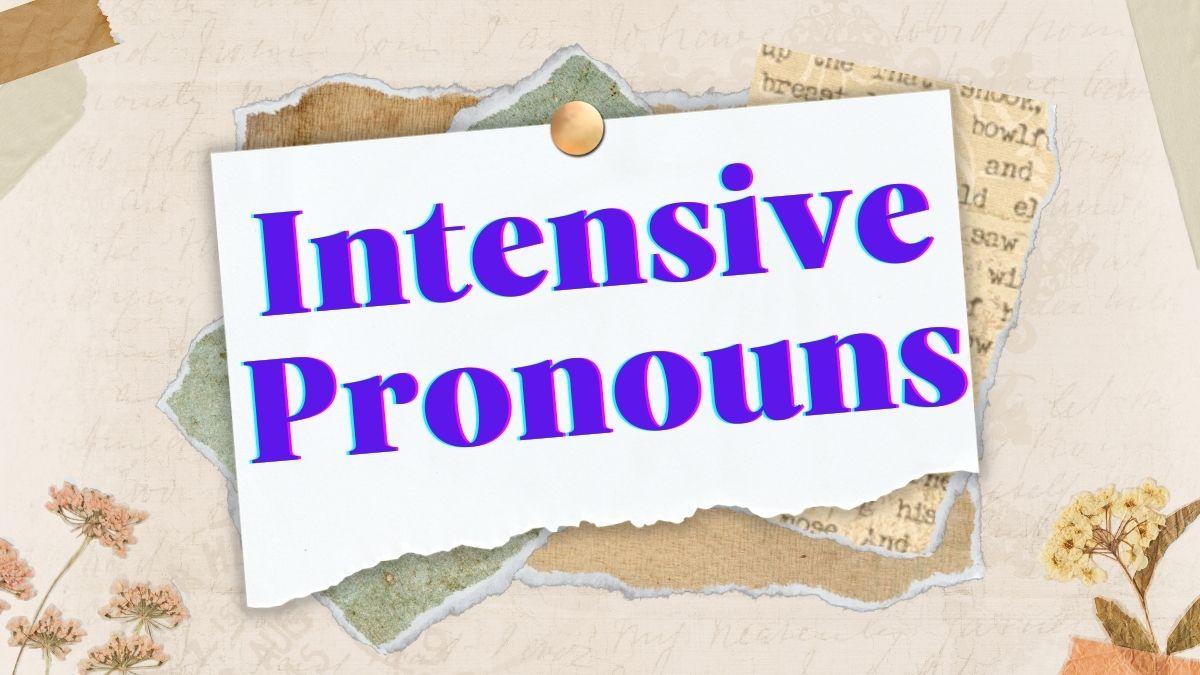Table of Contents
Intensive Pronouns are one of the most important types of pronouns in the English language. The name of the intensive pronoun itself suggests that it is used to increase the intensity or emphasis of certain words or characters. As these pronouns are rarely discussed and taught in schools, thus the questions on these pronouns seem tough to students, despite being very simple. To help students in this regard, we are providing them with the detailed knowledge about Intensive pronoun below.
Intensive Pronouns
An intensive pronoun is very similar to a reflexive pronoun, but they have different functions. Intensive pronouns are utilized to provide emphasis on the subject or antecedent within the sentence. Intensive pronouns are typically placed directly after the noun or pronoun they are modifying, although this is not always the case.
Intensive and reflexive pronouns consist of myself, yourself, himself, herself, itself, ourselves, yourselves, themselves. Moreover, an intensive pronoun is characterized as a pronoun ending in “self” or “selves” which emphasizes the antecedent.
What is an Intensive Pronoun?
An intensive pronoun is almost identical to a reflexive pronoun, causing confusion for many ESL students. Understanding the distinct functions of each pronoun would make things much simpler. An intensive pronoun enhances the action of the subject in a sentence.
An intensive pronoun, also known as an emphatic pronoun, is a term used to give extra emphasis to a different noun or pronoun (such as “the man himself”). It may suggest something unique or surprising or set the individual or object apart from others.
In the English Grammar, intensive pronouns are the same as reflexive pronouns as they always end in -self or -selves, but their grammatical purposes are distinct. Intensive forms exist for all personal pronouns and for the impersonal pronoun “one.”
Intensive Pronouns Definition
Check the definitions of the Intensive pronouns by famous English language dictionaries below.
The Merriam-Webster Dictionary explains that an intensive pronoun emphasizes a noun or pronoun before it (like in “borrowing is itself a bad habit”) and is a personal pronoun joined with -self used with a noun or pronoun or as an adjunct (such as itself in “the cat looked innocence itself” or himself in “he made it himself”).
An intensive pronoun, as defined by Collins Dictionary, is a pronoun used to emphasize a noun or personal pronoun, such as himself in the sentence “John himself did it.” In English, intensive pronouns have the same form as reflexive pronouns.
Intensive Pronouns Examples
The Intensive pronoun can be both of the singular and plural type. The famous examples of intensive pronouns are yourself, himself, itself, etc. Candidates can check both singular and plural type of examples of emphatic pronouns below in the table.
| Example of Intensive Pronoun | Type of Intensive Pronoun | Sentence Examples |
| Themselves | Plural Intensive Pronoun | They themselves took care of it and informed the police about the theft in their house. |
| Yourselves | Plural Intensive Pronoun | I do not know what to do with you. You yourselves go and talk to the concerned authorities about what you have done. |
| Ourselves | Plural Intensive Pronoun | We ourselves have to find a way out of this mess. |
| Myself | Singular Intensive Pronoun | I myself did not do it. |
| Himself | Singular Intensive Pronoun | Nobody could believe that he himself would break his own door. |
| Yourself | Singular Intensive Pronoun | Did you yourself finish the whole lasagna? |
| Itself | Singular Intensive Pronoun | The parrot itself somehow opened the cage and flew away. |
| Herself | Singular Intensive Pronoun | She herself found the solution to the never-ending conundrum. |
Usage of Intensive Pronouns in Sentences
An intensive pronoun must always be used alongside a noun or another pronoun; it cannot function independently as a subject or object. Let us understand this thing using examples.
- Why don’t you ask himself? – Incorrect
- Why don’t you ask the man himself? – Correct
- Myself have never been to Australia. – Incorrect
- I myself have never been to Australia. – Correct
Intensive pronouns typically come right after the antecedent, which is the noun or pronoun they refer to, yet they can also appear elsewhere in the sentence. The type of emphasis can change depending on where the intensive pronoun is positioned.
Carefully check the placement of intensive pronouns in the following sentences to know the above mentioned concept.
- You yourself should do it. [more emphasis on the person]
- You should do it yourself. [more emphasis on the fact the action will be performed alone]
At times, the intensive pronoun comes before the noun it refers to, set off by a comma. Placing the emphasis directly after the antecedent is similar. This word order is not as commonly used and typically does not flow as smoothly as other choices. The example of the Intensive pronoun used before the antecedent (the noun or pronoun it refers to) is given below.
Myself, I wouldn’t go, but the choice is yours.
Difference Between Reflexive and Intensive Pronouns
Have you ever pondered the distinction between a reflexive pronoun and an intensive pronoun? It is easy to distinguish between a reflexive pronoun and an intensive pronoun: intensive pronouns are not necessary for the basic meaning of a sentence, while reflexive pronouns are. The basic difference can be found by looking the meaning of both the pronouns.
- An intensive pronoun is utilized with a noun or pronoun to give it extra emphasis. The meaning of the sentence remains intact despite its potential exclusion.
- A reflexive pronoun is utilized instead of an object pronoun if the subject and object refer to the same person or thing. The meaning of the sentence relies heavily on it.
To distinguish between an intensive pronoun and a reflexive pronoun, take it out of the sentence; if the sentence remains coherent, then it is an intensive pronoun. If removing the pronoun from the sentence results in it not making sense, then it is a reflexive pronoun.
Example: Did you yourself make the cake?
If we remove “yourself” out of the statement, “Did you make the cake?” it would still make sense. “yourself” is hence an intensive pronoun in this instance. Examine the following sentences’ intensive pronouns:
- I myself like a little stroll after dinner.
- We went to hear the man himself speak.
- The author approved the book cover herself.
Intensive Pronouns Exercise
Let’s verify your understanding of the distinction between the usage of an intensive pronoun and a reflexive pronoun in a sentence. Determine whether the highlighted words in the sentences provided are reflexive pronouns or intensive pronouns.
- You yourself told me that.
- Did you do all of it yourself?
- Give yourself a break
- Will they be able to take care of the whole thing by themselves?
- I myself had to take care of our pets as no one was free to stay home with me.
- The investment pays for itself.
- We ourselves found a place to stay in the woods as it got too late.
- The robot can complete many tasks itself.
- Do you think that he can finish cleaning the house all by himself?
| Related Articles | |
| Relative Pronouns | Subject Pronouns |
| Demonstrative Pronouns | Interrogative Pronouns |
| Object Pronouns | Personal Pronouns |



 Hyperbole- Explanation, Definition, Exam...
Hyperbole- Explanation, Definition, Exam...
 500+ Antonyms Words List for Kids, Downl...
500+ Antonyms Words List for Kids, Downl...
 Vocabulary Words with Meaning and Senten...
Vocabulary Words with Meaning and Senten...










